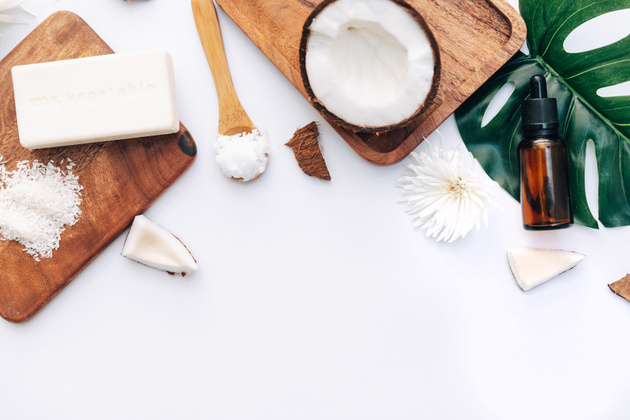Coconut Oil: Benefits, Effects, Uses
Coconut oil, which has become very popular around the world today, has started to be included in various cosmetic applications and healthy nutrition routines.

Coconut oil, which has become very popular around the world today, has started to be included in various cosmetic applications and healthy nutrition routines. Many studies continue to be conducted on the effects of coconut oil on human health. Scientific opinions about the benefits, uses and harms of coconut oil are increasing.
What is Coconut Oil?
Coconut is a tropical fruit with a very high fat content. Coconut oil is a edible oil obtained by extracting the oil from the inner parts of mature coconuts through some methods. Coconut oil, which is included in some diets and cosmetic products today, contains a high percentage of natural fat, unlike many vegetable oils. The saturated fat content is approximately 80%, which is similar to animal fats.
Coconut oil contains 65% medium chain fatty acids known as MCT oils. Some of the fatty acids it contains are; lauric acid (47%), caprylic acid (7%) and capric acid (5%). Apart from fatty acids, it contains some bioactive components such as vitamin E and polyphenols. Thanks to its rich content and positive studies on MCT oils, it can be preferred as a healthy alternative by many individuals who do not consume animal fats (for example, vegan individuals, individuals with lactose intolerance).
What are the Benefits of Coconut Oil?
Coconut oil is the subject of various researches because it is rich in some polyphenols and vitamins, in addition to the macronutrients it contains. It is thought that coconut oil, which is a type of oil frequently preferred especially in ketogenic diets and low-carbohydrate nutrition routines, may have some benefits for human health with adequate and regular consumption. Therefore, it is increasingly becoming a part of a healthy diet. Research continues on coconut oil, which has been shown to have some benefits for the skin when used externally.
What are its benefits to the skin?
Thanks to its antimicrobial and high moisture content, coconut oil can be easily applied to the skin. According to some studies, coconut oil can increase the moisture content of the skin when used regularly. It is known that it can have a soothing effect on the skin, especially for those with dry skin and those whose skin becomes dry due to reasons such as the use of disinfectants. In addition, it is thought to reduce mild to moderate symptoms caused by atopic dermatitis, which causes skin irritation.
What are its benefits for hair?
The nutritional content of coconut oil and its ability to penetrate deeply into the hair raise curiosity about its external use for stronger hair. Many studies on this subject show that coconut oil can increase the flexibility of the hair by affecting the hair strands, thus helping to prevent hair breakage. However, more studies are needed.
What are the Benefits to Oral Health?
Lauric acid, the primary fatty acid of coconut, is known to have antimicrobial effects. Thanks to this feature, some studies have been conducted on its effects on oral health. One study found that lauric acid reacts with oral secretion and has a soap-like effect, which can help reduce dental plaque formation and treat inflammation in the mouth. More research is needed on the effects of coconut oil on oral health.
What are the Harms of Coconut Oil?
Although pure coconut oil has many benefits, the amount of oral consumption is associated with the risk of chronic metabolic diseases in the long term. Contrary to popular belief, coconut oil contains not only medium-chain fatty acids but also long-chain fatty acids. Since it contains saturated fatty acids, it is better to add it to the nutrition routine under the supervision of a physician or dietician.
As a result of some studies, it has been observed that individuals who regularly consume coconut oil have an increase in their blood cholesterol levels. As stated in many reports published in the medical world today, the amount of saturated fat consumed in the diet is directly related to cardiovascular health. In the Current Cardiology Report published in 2016, it was stated that coconut oil should not be recommended, especially for individuals who need to pay attention to their vascular health. It is recommended that these individuals prefer other vegetable oils rich in unsaturated fatty acids in their diet.
If you would like to acquire healthy eating habits and get detailed information about the oral or external use of coconut oil, you can consult a health institution.
Making a Hair Mask with Coconut Oil
Coconut oil is suitable for many hair types. It can be used externally to prevent protein loss, especially in dry, curly, breakage-prone hair. You can apply a mask regularly to your clean hair in the shower or after the shower by following the steps below:
- Apply coconut oil to damp hair. To do this, you can prepare your hair by wetting it with a spray or apply your mask after a shower.
- If your hair is ready, apply warm coconut oil evenly throughout your hair. For this, you can divide your hair into sections.
- When applying the oil, you can focus on the driest parts of your hair and the ends, and apply less to the roots.
- After applying the oil to your hair, you can cover your hair with the help of a mask cap or a suitable hair cap. This makes it easier for the oil to penetrate your hair, preserving its moisture content.
- This way, you can wait between 1-2 hours.
- Finally, clean your hair with warm water and shampoo.



